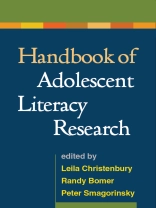The first comprehensive research handbook of its kind, this volume showcases innovative approaches to understanding adolescent literacy learning in a variety of settings. Distinguished contributors examine how well adolescents are served by current instructional practices and highlight ways to translate research findings more effectively into sound teaching and policymaking. The book explores social and cultural factors in adolescents’ approach to communication and response to instruction, and sections address literacy both in and out of schools, including literacy expectations in the contemporary workplace. Detailed attention is given to issues of diversity and individual differences among learners.
Winner–Literacy Research Association’s Fry Book Award!
Зміст
I. Overview
1. Introduction, Leila Christenbury, Randy Bomer, and Peter Smagorinsky2. Sociocultural Constructions of Adolescence and Young People’s Literacies, Donna E. Alvermann
3. Who Are Adolescents Today?: Youth Voices and What They Tell Us, Sam M. Intrator and Robert Kunzman
II. Literacy in School
4. Contexts for Adolescent Literacy, Judith A. Langer
5. Adolescents Who Struggle with Literacy, Larry R. Johannessen and Thomas M. Mc Cann
6. Proficient Reading in School: Traditional Paradigms and New Textual Landscapes, David O’Brien, Roger Stewart, and Richard Beach
7. Fostering Adolescents’ Engaged Academic Literacy, Ruth Schoenbach and Cynthia Greenleaf
8. Divided against Ourselves: Standards, Assessments, and Adolescent Literacy, James Marshall
9. Adolescent Second-Language Writing, Linda Harklau and Rachel Pinnow
10. Research on the Literacies of AAVE-Speaking Adolescents, Jamal Cooks and Arnetha F. Ball
11. Digital Literacies in the Classroom, Joan A. Rhodes and Valerie J. Robnolt
12. The Secondary English Curriculum and Adolescent Literacy, Robert Burroughs and Peter Smagorinsky
13. Visual Arts and Literacy, Michelle Zoss
14. Policy and Adolescent Literacy, Allan Luke and Annette Woods
15. Tracking and Ability Grouping, Jo Worthy, Holly Hungerford-Kresser, and Angela Hampton
III. Literacy Out of School
16. Preparing Adolescents for the Literacy Demands of the 21st-Century Workplace, Anne Beaufort
17. The Literacy Demands of Entering the University, Kathleen Blake Yancey
18. Literacy in Virtual Worlds, Rebecca W. Black and Constance Steinkuehler
19. Reading and Writing Video: Media Literacy and Adolescents, David L. Bruce
IV. Literacy and Culture
20. Literacy and Identity: Implications for Research and Practice, Cynthia Lewis and Antillana del Valle
21. Latina/o Youth Literacies: Hidden Funds of Knowledge, Carmen M. Martínez-Roldán and María E. Fránquiz
22. Beyond Hip-Hop: A Cultural Context View of Literacy, Yolanda J. Majors, Jung Kim, and Sana Ansari
23. Boys and Literacy: Complexity and Multiplicity, Michael W. Smith and Jeffrey D. Wilhelm
24. Lessons on Literacy Learning and Teaching: Listening to Adolescent Girls, Barbara J. Guzzetti
25. Literacy Issues and GLBTQ Youth: Queer Interventions in English Education, Wayne Martino
26. The Literacies of New Immigrant Youth, Danling Fu and Jennifer M. Graff
27. American Indian Adolescent Literacy, Mary Jiron Belgarde, Richard K. Lo Ré, and Richard Meyer
Про автора
Leila Christenbury, Ed D, is Commonwealth Professor of English Education at Virginia Commonwealth University (VCU). The author or coauthor of 12 books, she is a frequent speaker on issues of English teaching and learning and has been cited extensively in the national media. Dr. Christenbury has been honored with the David H. Russell Award and the CEE James N. Britton Award from the National Council of Teachers of English (NCTE). Additionally, she is a recipient of the Edward B. Fry Book Award from the National Reading Conference for the Handbook of Adolescent Literacy Research. She is a former editor of English Journal, a past president of NCTE, and past interim dean of the VCU School of Education.
Randy Bomer, Ph D, teaches in the Language and Literacy Studies Program in the College of Education at the University of Texas at Austin, where he also directs the Heart of Texas Writing Project. Formerly a middle and high school teacher, he has consulted with urban school districts across the United States. The author of two books and many journal articles, Dr. Bomer is a past president of NCTE.
Peter Smagorinsky, Ph D, teaches in the Department of Language and Literacy Education at the University of Georgia. He currently chairs the NCTE Research Forum. Dr. Smagorinsky has received honors including the Raymond B. Cattell Early Career Award for Programmatic Research from the American Educational Research Association, the Janet Emig Award from NCTE’s Conference on English Education, and the Distinguished Research in Teacher Education Award from the Association of Teacher Educators. He has published 14 books and numerous journal articles.












